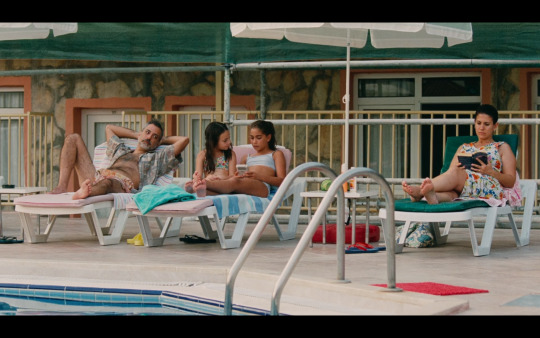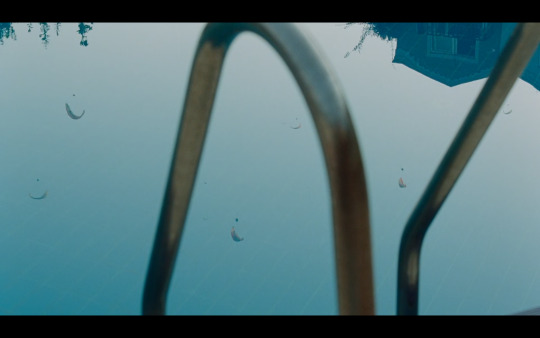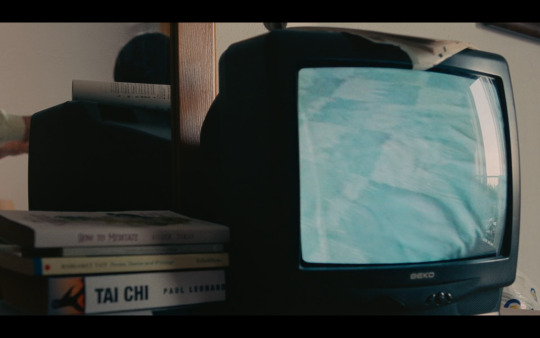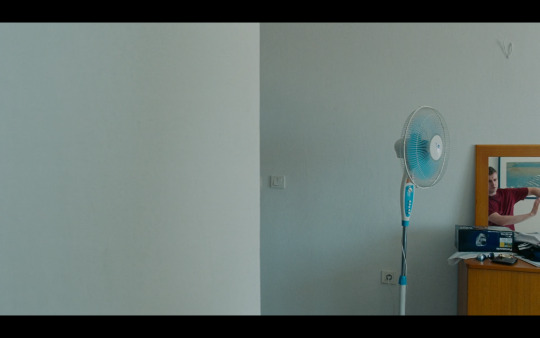#aftersun spoilers
Text
I watched Aftersun earlier this year and I was dissatisfied with it because I felt it was too ambiguous, but I haven’t been able to stop thinking about it. So today I was thinking about it and it finally clicked that when the dad goes into the back room after filming her, he’s in the eternal rave where he lives in her mind. She never sees him again because he goes straight to that room, that making her possessing the video tapes and the rug—implying these were left to her after his passing.
Because I didn’t know he was dead at the beginning of the film, I didn’t understand that his departure at the end meant death instead of something like abandonment/estrangement. But now that I’ve processed the finality of the video tapes for Sophie, I understand the film much much better.
3 notes
·
View notes
Text
aftersun is an absolute masterpiece
not having watched a single trailer, i didn't know what to expect and the thing about this film is ...
you know from the start something bad is going to happen. nobody makes an artsy movie about a great childhood memory.
and you get these snippets of the rave that leave you dreading what's about to happen.
and you have this in the back of your mind the whole time, but you can't help but enjoy the adorable relationship between sophie and her dad and the funny moments between them.
but you know something bad is going to happen. you see callum teaching sophie self defense, you see her discovering her sexuality and you think: oh no.
sophie saying that her dad lied about having a diver's license and the camera lingers on the water, nobody in sight and you think: oh no.
and then at the end, when they're dancing together and everything is just so unbelievably happy, and under pressure starts playing and you get it.
callum saying his parents forgot his 11th birthday, him buying the carpet he can't afford, him saying he didn't think he would live to see thirty, his face when sophie talks about feeling down, him not smiling when they sing happy birthday, him breaking down in the hotel room, them talking about cleopatra. and then he says goodbye to sophie. and he walks away from the camera. into the rave. and you're crying. end of movie.
11 notes
·
View notes
Text
I watched Aftersun over the past day and a half and it really affected me, especially because I knew nothing about it going in and it took me a while to realize what was going on. Not a mom myself but I recognized the palpable anxiety Calum had when realizing his daughter is going to inherit the depressive tendencies he tries (increasingly unsuccessfully) to hide from her and he knows he won't be around to help her through them, because his impending suicide is going to happen either way. I just recognize some of the bad patterns of our family showing up in my nieces behavior and I know...I'm equally powerless to stop it, not because I'm going anywhere (I'm not) but I'm just not sure how and neither is anyone else, just as I couldn't stop myself from inheriting my dad's stereotypical Scottish temper and restlessness. And like Calum, he became a dad very young and didn't really deal with it well sometimes.
I kind of think the movie's different when you're an adult of a certain age and have been on both sides and know that sometimes....there are some things you just can't wrap your head around completely, no matter what.
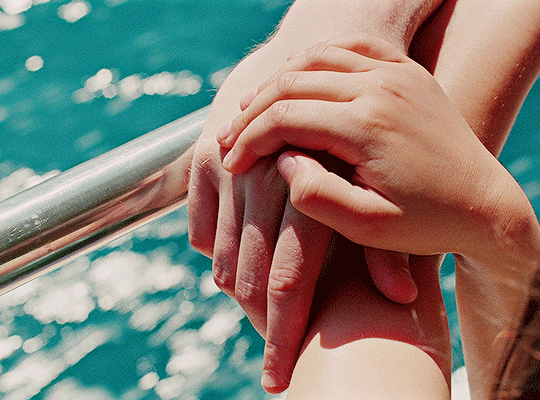
#aftersun#aftersun spoilers#in my feels#also i had serious anxiety when that kid was walking around the resort alone at might
4 notes
·
View notes
Note
I watched Aftersun with my sister and she held it together for the most part but during the “Under Pressure” scene she cried buckets!
Oh amazinggg, I am not exaggerating when I say I think about that scene almost everyday and it's been months lol. I don't blame her!!!
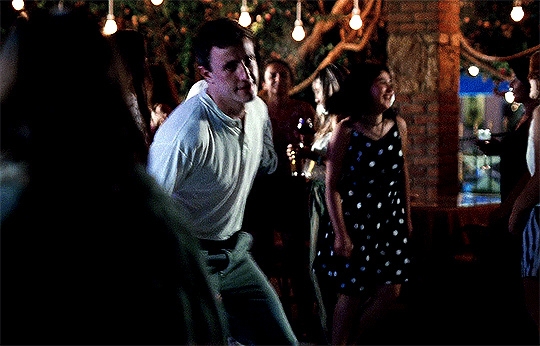
#would you believe me if i said that's the very scene that'll make you cry#asks#anonymous#movie talk#aftersun#aftersun spoilers
6 notes
·
View notes
Text

okay okay, my aftersun thoughts. going to do some spoiler free ones and then some more spoiler-y ones below a read more line. overall i really liked it and will probably watch a second time eventually just to see if i catch anything i didn’t the first round. 4.5 stars from me (-:
- if you like the musical fun home you would love this i think. i saw a lot of bruce and alison in calum and sophie.
- the editing at the beginning was a bit headache inducing, and same for the strobe light moments that pop up throughout the movie. totally understand the purpose/symbolism, just not my personal vibe.
- i think i love kid/childhood centered movies so much bc it blows my mind when kids are like- really good actors. this little ‘poppet’ as she’s called in the film was incredible. i want to see her in more things.
- there were a few things that felt vaguely confusing/plot holey which i’ll get more into under the cut but it was nothing bad enough to fully take away from how much i enjoyed the film!
- the directing/cinematography was beautiful. there’s one moment esp where you can only see them in the reflection of a tv that really got me.
- this was my first paul mescal film and i thought he was great! divorced dad trying to dad™️ is one of my favorite tropes of all time and he didn’t let me down.
SPOILER-Y THOUGHTS UNDER THE CUT
- i’m glad they didn’t go in a more sinister direction with the teenage (young adult?) boys. i was worried they might and definitely saw an opportunity for it but was grateful they didn’t.
- i fully thought the girl in the club was sophie’s mom, not sophie, until like an hour ago and thought it was flashing between them bc calum was seeing her turn into her mother and it scared him. i was, apparently, wildly incorrect in that interpretation LOL. but the last dance scene is still beautiful nonetheless, even if a bit too heavy on the strobe lights for my taste.
- the first time i cried was when the resort singer whipped out unchained melody…hi e!
- was digging around film twitter and apparently ppl are pretty split on if calum is gay but personally i did get that vibe.
- the fun home ring of keys vibe with sophie seeing the two guys kissing and the scene almost right after of her as an adult waking up next to a woman got me down baddd. my favorite moment right under the final dance scene. and the happy birthday scene. and the phone booth and the- okay i’ll stop now i liked this movie if you couldn’t tell.
- re plot holes i just felt like we never got a full picture of what was going on with calum that was making him spiral? i feel like more context as to why things didn’t work out with sophie’s mom would’ve fixed that. back to the gay!calum theories.
- i went in completely blind except for the synopsis bc i didn’t want any spoilers and there were multiple times throughout the film where i thought calum was going to die or kill himself. but maybe that’s just my anxiety!
- sophie reminded me sooo much of little me. the wearing a bikini under your clothes to feel like you’re wearing a bra. starting to see your dad as infallible. being enamoured with older kids. the scene where the older girl gave sophie her resort bracelet made me so (,: another one of my favorites.
3 notes
·
View notes
Text

x
32 notes
·
View notes
Text
The Films of 2023 That Emotionally Wrecked Us
As I have gotten older, I am not afraid of having a good old-fashioned ugly cry in the cinemas when the time calls for it, and hell, I probably got emotional just writing this list (Spoiler: I did). Sometimes, they are tears of grief or tears of joy, and even still, sometimes, they are tears of anger. Emotion is a core part of the cinema experience. If you can’t get us to respond emotionally to…
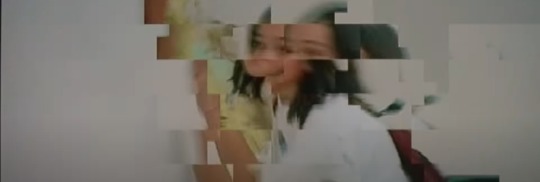
View On WordPress
#2023#Aftersun#Best of#Countdown#Crater#Creed III#Cry#Emotion#Guardians of the Galaxy Vol. 3#Killers of the Flower Moon#Le otto montagne#List#Loki#Oppenheimer#Silo#Spoiler Alert#Star Trek: Strange New Worlds#Ted Lasso#The Boy and the Heron#The Creator#The Eight Mountains#The Last of Us#Till#Uproar#Women Talking
0 notes
Text
'When it was announced that Andrew Scott and Paul Mescal would be starring as lovers in All of Us Strangers, a film written and directed by Andrew Haigh, fans were buzzing on social media about what the combination would deliver. This was no surprise: Andrew Scott – already a celebrated actor from roles such as Moriarty in Sherlock, the ‘hot priest’ in Fleabag, and Gethin in the incredible 2014 film Pride – and Paul Mescal (Normal People, Aftersun) are the definition of queer catnip. Under director Haigh’s masterful eye, the end product is an enthralling exploration of what it means to be queer in today’s Britain. Even ahead of its general UK release, the film has already made an impact and literally shifted the language we use about gay/queer representation on screen.
Haigh – acclaimed for past feature films Weekend and 45 Years, as well as HBO series Looking – has crafted a tender examination of love in the shadow of shame. An enigmatic dive into the pain and pleasure of finding affection in another man through the constrictive confines of emotional isolation, All of Us Strangers excels on so many levels.
The premise: forty-something Adam (Scott) meets Mescal’s twenty-something Harry, and the pair begin a love affair that has Adam revisiting his childhood home and conjuring up the ‘ghosts’ of his dead parents. And no, that’s not a spoiler, it’s just the opening scenes of a film that examines a love affair between two gay/queer men of disparate ages whose very different life experiences have brought them unexpectedly together. What happens next? Well, that’s for you to discover in a movie theatre near you. Essentially, All of Us Strangers is one of the most enthralling films of the 21st century to explore British gay identity, and Scott delivers quite possibly the performance of his career to date, one that dances between visceral suffering and emotional vulnerability.
Here, Scott talks to Attitude about bringing his character Adam to life on screen, working through shame, and the power of sex as a means of communication.
Cliff Joannou: A good place to start is to say that I really related to the film. I grew up in Croydon not long after director Andrew Haigh did, so the environment and era that it was set in really resonated with me.
Andrew Scott: You’re joking me.
For real. Even that shot with you as your character Adam walking through the Whitgift Shopping Centre, I was like, ‘Oh, that’s a little bit close to home.’ That’s exactly what it looked like when I was a kid. What resonated most with you in the story? For me it was very much the setting and location, being a young child in the UK after the worst of the AIDS crisis.
I suppose it was the dynamics within the relationships, that was what I found most authentic. And there’s two storylines within the movie, and both of them I found to be really, really beautiful and very actable. The scenes between Adam and his parents are genuinely extraordinary. And what’s so lovely is when I was in LA after the film had come out, and audiences had started to see it, and I’m really getting such a strong sense that people really do appreciate the nuance of the film.
I think the chief value of the film, for queer audiences particularly, is that it recognises that the dynamic within families isn’t always necessarily as dramatic, perhaps, as it is portrayed sometimes in stories about coming out, in the sense that it’s not fully embraced acceptance and nor is it outward rejection, but for a lot of queer people it’s somewhere in between, so that brutality and intolerance and doubt can exist alongside real love within families.
Absolutely. I like how frank the conversations are between Adam and his parents. I also like how early the conversation about Adam’s sexuality comes up with his parents.
What I love about that scene is that he doesn’t want to come out to his mum, he doesn’t want to have a coming-out scene. He’s a man in his forties, and he’s lived a life on his own for 30 years, so he wants to tell her about himself, and that includes, of course, him being gay, so he tries to be offhand about it, but also, I think my challenge was to show that he deeply cares what she thinks as well. And when she starts to be loud and wrong and reveals some prejudice in her questions, it enrages him.
But I think that exists alongside a real deep need for her to accept him, too. I think that scene is just so beautiful because it’s something, of course, that he’ll have thought about given the fact that he lost his parents 30 years ago. One of the things that I find really moving is when people talk about having lost their parents and never having come out to them before they died. I’ve talked to 60-year-old men who say, “I never got to do that.” And I think that really takes up a lot of people’s time.
Did you discuss with Andrew [Haigh] any of Adam’s wider backstory or did you create one for yourself? Where had he been in that time in between?
Not with a huge amount of detail because I suppose I thought of what benefit was that going to be. There were certain things I sort of thought about a little bit, but my biggest challenge, and all of our challenges, was to make those scenes as authentic as possible. We shot in Andrew’s childhood home, and that was such a brave thing for him to do. And I felt very much that if I were to think about any backstory, I wanted to think about my own; I wanted to bring my own stuff. To bring not necessarily my own biography, because it differs a huge amount from the character’s, but certainly my own emotional biography, as I call it.
It feels like such an extraordinary privilege to be able to play a character like this. And I wanted to give as much of myself because it was cathartic for me. I never thought that I would be able to watch a film like this, let alone be at the centre of it, so I wanted to be able to take that opportunity to express myself in some way. Why pick an imaginary backstory from somewhere else? I wanted to bring as much of myself as I could, because I feel like that’s what the audience is going to relate to the most.
There’s a bit early in the film when Adam meets his parents’ ‘ghosts’ for the first time, and he says, “Everything’s different now.” It’s such a powerful line as it highlights the character’s inability to let go of the past because doing so means he has to confront his present unhappiness.
Yes, exactly. Well, I suppose one of the best things that you can do as an actor is to say things to feel one thing but to say something else. That’s always what you want as an actor. A lot of the real interesting lines in the film are where people are saying one thing but meaning something else. When Adam says, “Everything’s different now,” I’m not sure that he fully believes that. He believes it in some way. But one of the things that I really love about the story is when Paul’s character of Harry talks about his estrangement from his family and he’s somebody who’s in his twenties.
I’m not sure the generational difference between Adam and Harry is the most interesting thing about the film. I think one of the big changes, of course, is the presence of Aids, when Adam would’ve been growing up. I certainly know that the shadow of Aids was very looming when I was growing up in the nineties. And, of course, that’s going to affect the way we think about sexuality in the sense that we’re going to feel like we’re going to be punished for being physical or for expressing love.
There’s another impactful moment where Adam says, “I thought if I fucked anyone I’d die.” It took me a while to get my head out of that space and allow my sexuality to be something that I enjoyed and recognise that it was not a threat to my life. How was your journey to finding peace with your sexuality?
Oh, it’s one of the wonderful things, the emancipation from that. I feel so incredibly… I suppose I just enjoy being gay so much on so many levels, I think it’s such a wonderful thing to me. It’s an extraordinary gift to my life and just to be able to see the real beauty in being gay is completely wonderful. The older I get, just the more I feel so lucky to have been born gay and that pervades my life in the sense of all my friendships. I have so many amazing queer friends in my life now that I just adore.
What’s very sad for some of us is that we avoid those kinds of people when we are shredded in our own shame. To be around other gay people highlights something that you don’t want to see, but when you do want to see it, it becomes completely wonderful. I feel such a huge sense of camaraderie with other queer people now, and without sounding too hippy about it, I feel like I just want to spread that love and positivity in our community because we’ve come such a long way, and it’s important that we are kind and look out for each other and celebrate how uniquely different and how fucking wonderful that can be.
That’s beautiful. I remember when I was younger and less comfortable in my identity, I avoided going to Pride, I felt it was a little bit too in my face. Now as I get older, I go there with my nieces, and we watch the parade, and there’s a tremendous sense of healing that comes with being around the community. And the broader the community gets, the more all these letters in that ever-expanding acronym stand out, the more beautiful it gets.
When I see two people of the same sex holding hands walking down the street, I’m like a little weirdo. I’m smiling at them. They’re like, ‘What’s that dude smiling at us for?’ Because I just think it’s so wonderful. It’s easy what you say about everything is different now. It’s something that I always feel when people say, “Oh, it’s 2024, you’ve got to get with the times.” I always find that preposterous because, and I mean this so vehemently, that different forms of sexual identity and gender identity have existed since the beginning of humanity. They have existed and will always exist until humanity ends. In 2084, they’re going to look back at us and think, ‘My God, those people were so old-fashioned.’ Sexuality, that’s not a fashion, it’s a natural state of being.
When I watch the relationship between Adam and Harry, there’s no point at which you feel like the sex scenes are being played for the audience’s titillation. It is one of those kind of rare sex scenes that actually drives the narrative forward, that it is important to the story.
Sex is just communication, isn’t it? It’s just physical communication rather than verbal communication. And what needed to be communicated is how I think we see Adam as somebody who hasn’t been touched by anybody or touched anybody in a long time, not just sexually, but he needs affection from his parents, and he needs love and sex and affection from his lover. And I think just seeing that tentativeness and the way Paul plays a character who’s a bit more sex-positive, so to speak… Their communication is really strong in that scene. I’m so proud of it. I really am because I feel like they represent the characters so beautifully.
How did you arrive at that point of playing those scenes in that way?
We didn’t over-rehearse it. We knew that those scenes, particularly the early ones, had to have a sort of frisson. And we had an intimacy coordinator, which can be very helpful for the simple reason that if you’re able to talk to somebody about your fears or what you want to show, what you don’t want to show, or what you think it should be and what the narrative of the storyline is, you have that base of safety. It actually makes you feel like you can do whatever you want. Because frankly, you just know that if there’s something that you don’t like, you’re contractually protected, and it won’t end up in the movie.
Andrew [Haigh] is really good. Sometimes when you do sex scenes, it can be like, ‘Oh my God, D-Day.’ And you are a bit nervous, of course, because you take your clothes off in front of strangers, but he’s like, “It’s just another scene,” so you don’t want to overdo it. But chemistry is a really interesting thing. You’re basically just listening to see what the other person is doing physically in the same way you would in a dialogue scene. And you can talk about that as much as you like, but until you’re actually there, it’s not alive in that way, so it’s just about listening, but just listening with your body, basically.
There’s a line in the film where Adam tells Harry, “Things are better now, but it doesn’t take much to feel the way that you felt.” Is there an instance where you remember, ‘Oh, that’s the first time I was made to feel shame?’
I don’t think that there is one particular point, but I do think if we could erase the assumption in our society that everybody is straight until proven otherwise, it would make an enormous difference to people. And by that, I mean that we don’t say to our six-year-olds, “You’re going to marry a princess, and have you got a girlfriend?” I remember when I was a teenager and people said, “Have you got a girlfriend?” I would say no, and I wasn’t necessarily lying, but you feel like you’re lying by omission.
For me, what happened is that you desexualise yourself slightly. And I think that what happens for a lot of teenagers is that there’s a conspiracy of silence around you, and that is a lonely place to be. And I think that’s where we become very hardworking, that we pour our energies into something completely different in order to correct what we imagine is a flaw in our character.
Some people go the opposite [way], where they become self-destructive; you can be super hardworking and incredibly ambitious, or you can just completely go off the rails. You think, ‘Well, I have been rejected, so I’m just going to go crazy.’ It affects our psychology in so many different ways. It may not necessarily be something that’s actually happened to us; it could be just forecasting what you think might happen, and that forecasting happens when we read about prejudice or other horror stories. The way the media talked about gay people when I was growing up was absolutely disgusting and fearmongering, and I still think we have to be very careful in not just the media, but in the way that we consume media and what we stand for. That we call out that kind of cruelty and intolerance. Language matters.
When we read the opposite, when we read positive things or see representation on screen, when we see ourselves, we think, ‘Oh, well, we can forge a way in the world.’ That’s why I think a movie like this, it is so incredibly important because it’s incredibly compassionate and tender, but it also doesn’t erase the fact that it’s painful and it can be lonely being gay. And there’s a certain thorny path that we all have to go to in order to find love, not just in another person, but in ourselves.
The clip from the Hollywood Reporter where you talk about the use of the term ‘openly gay’ went viral and has likely changed the way we refer to out queer actors in future forever. What went through your mind when you saw the reaction to that?
There’s something about that phrase that makes me uneasy about what it implies. Particularly now. You don’t put ‘openly ’in front of most attributes or characteristics. And I think we should maybe look at retiring it. And I know I’m not alone in that. The response to the clip reflects that. I do understand that historically we need a word to recognise the fact that there are sometimes people that are gay but for whatever reason aren’t able to be open about it. I totally get that. And so, I just feel the word ‘out’ does that. It’s just simpler. It does the job, and with less implications.'
#Andrew Scott#All of Us Strangers#Paul Mescal#The Hollywood Reporter#Andrew Haigh#Weekend#45 Years#Looking#HBO#Normal People#Aftersun#Fleabag#Hot Priest#Moriarty#Sherlock#Pride
7 notes
·
View notes
Text
im finally emotionally stable enough to write out my iron claw thoughts. summoning mely here because its all spoilers <3 @delicatepoets
the performances were PERFECT!!!! i knew harris dickinson would be amazing but zac CARRIED the movie!!!! not that the other actors weren't good but sm of it relied on him. compared to something like aftersun, where the performances were amazing but the script/directing was really creative and thoughtful, it felt like the iron claw really needed top acting to work.
maura was SO!!!! in every scene!!! i could not stop watching her and trying to figure her out. and i was surprised how good the actor who played mike was bc he faded into the background the majority of the movie. but when he became the focus - i sobbed during the press conference. everyone did a good job. the only thing is that i didnt really 'get' kerry? i was most surprised ab that because of how good he is in the bear. i think it had to be the script.
overall it broke me. i hope zac gets some awards attention but i think the campaign might be undermined by the 'averageness' of the directing and script. apparently a lot of the story was left out, it messes with the timeline a lot, and the pacing was not great. and i think the director could've used angles better!!! i wouldn't normally notice but when physicality is part of the movie u think they would make sure the wrestlers dont look smaller than the announcer!!!!!!! i noticed some people say this ab zac but he looked massive. i didnt think he looked short at all. but they should've done a better job filming kerry.
16 notes
·
View notes
Text
Best of 2023 - Movies
Seems like I did run into more than one almost perfect movie this year, but the number one, definitely one of the most brilliant film I ever watched. And no, it's not the new Basic Instinct but I can see a little bit of resemblance.
01. Anatomy of a Fall - Dir: Justine Triet - 2023 - "Marriage, the film suggests, is like a mosaic. One or two highly coloured tiles might catch the eye but they can’t, on their own, show the whole picture. The reports we get of Sandra and Samuel’s life together (there is only one flashback in the film; most of what we learn comes from the evidence presented in the court) suggest a relationship that gets chillier and spikier by the minute. But then the prosecution’s case relies on cherrypicking the trauma and the deep-seated unhappiness in the marriage, and foregrounding the character traits in Sandra that might make her capable of murder. A choice of other, sunnier moments, as Sandra reasonably points out, would paint an entirely different picture of her relationship with her husband." - The Guardian

02. Saltburn - Dir: Emerald Fennell - 2023
03. Aftersun - Dir: Charlotte Wells - 2022
04. Past Lives - Dir: Celine Song - 2023 = "Towards the end of Celine Song’s Past Lives, two old friends wait for a cab in front of a bright blue garage door. In the two minutes it takes for a car to arrive, both everything, and nothing happens. Writer and director Song is perhaps more attuned to rhythm of dialogue than most: like Nora Moon (Greta Lee), the protagonist of this feature debut, she made her name as a playwright. But Song is also sharply aware of the power of the unsaid, of what can be articulated through pauses and gestures. As the film swells to its emotional climax, not a word is spoken." - British Film Institute
05. Tár - Dir: Todd Field - 2022

06. Leave the World Behind - Dir: Sam Esmail - 2023
07. Bros - Dir: Nicholas Stoller - 2022
08. Rurangi - Dir: Max Currie - 2020 - "Director Max Currie lets the bleak landscape and the conflicted characters tell the story, and the plot resolution, when it comes, is incomplete but full of hope. There are some terrific lines of dialogue: Jem tells Caz: “you’re like the same, but you’re not”, and he adds: “ gender-it’s complicated; you were never exactly girly”. In a sickbed reconciliation, father Gerald tells Caz:” It’s not my world… I want you here”. Anahera has the final word on this: “ most people are just idiots about other people’s sexuality. You just do you”." - Scene Magazine
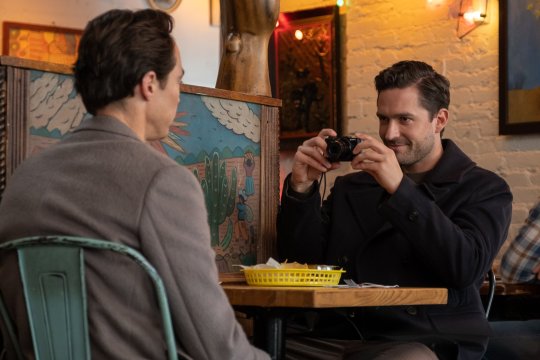
09. Spoiler Alert - Dir: Michael Showalter - 2022
10. Saint Maud - Dir: Rose Glass - 2019
11. The Innocents - Dir: Eskil Vogt - 2021
12. Lamb - Dir: Valdimar Jóhannsson - 2021
13. The Whale - Dir: Darren Aronofsky - 2022
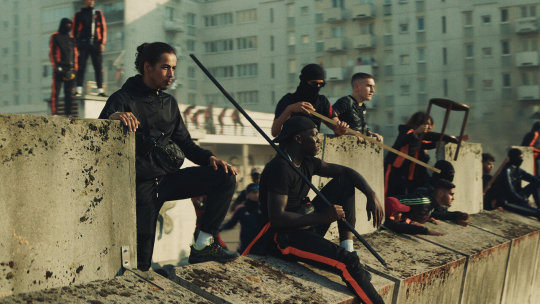
14. Athena - Dir: Romain Gavras - 2022
15. Possessor - Dir: Brandon Cronenberg - 2020 - "It’s all very compelling, well-acted and presented, although there’s a chilliness and a clinical edge that is very Cronenberg-ian, but might keep audiences at arm’s length. Ditto the violence. Stabbings, shootings, pokerings (use your imagination) — it’s all here, bar exploding heads. A strong stomach is required. If you don’t have one, just use someone else’s." - Empire
16. What's Love Got To Do With It - Dir: Shekhar Kapur - 2022
17. Nuovo Olimpo - Dir: Ferzan Özpetek - 2023
18. Are You There God? It's Me Margaret - Dir: Kelly Fremon Craig - 2023
19. Joy Ride - Dir: Adele Lim - 2023
20. Earthquake Bird - Dir: Wash Westmoreland - 2019
21. Cruella - Dir: Craig Gillespie - 2021
22. The Daughter - Dir: Simon Stone - 2015
23. Nope - Dir: Jordan Peele - 2022
24. Film Stars Don't Die in Liverpool - Dir: Paul McGuigan - 2017
25. Don't Worry Darling - Dir: Olivia Wilde - 2022
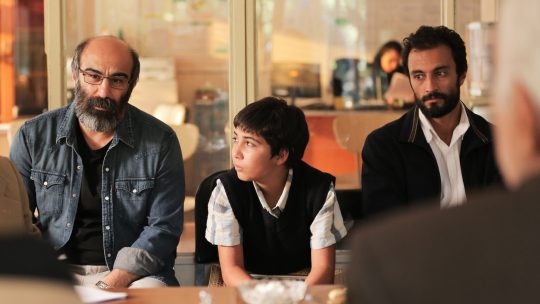
26. A Hero - Dir: Asghar Farhadi - 2021
27. You Hurt My Feelings - Dir: Nicole Holofcener - 2023
28. Anaïs in Love - Dir: Charline Bourgeois-Tacquet - 2021 - "The pleasures of Anaïs in Love largely derive from the nuanced performances by Demoustier and Bruni Tedeschi. The latter, for once, is not required to be tearful or neurotic, and the growing attraction between her and Anaïs is convincingly handled – even if one could quibble at a couple of cliché moments, such as the two women’s encounter under an apple tree (in which Anaïs gives Émilie an apple) and the nowadays seemingly obligatory sea-shore setting for the lesbian love scene. The excellent Demoustier sustains the entire film, indeed named after her. Her choice was not accidental: Bourgeois-Tacquet had already cast her as the lead in her 2018 short Pauline asservie. (Both the short and Anaïs in Love were shown at Cannes in 2021 – quite an accolade.) Ebullient and ‘cute’ especially when seducing Daniel or Émilie, Demoustier is equally believable as an aggrieved daughter when she finds out that her mother’s lethal illness has returned. Her irrepressible energy and artless beauty underline her precise rendition of a modern young woman bent on following her own desire, straight or queer – at times to the point of insensitivity. Indeed, it’s hard to think of another actress who could have made Anais’s exasperating unreliability, egocentricity and excessive volubility forgivable, let alone endearing, as they are evidently supposed to be. Fans of Eric Rohmer may be reminded of some of the young heroines in his ‘Comedies and Proverbs’ (1980–1990) and ‘Tales of the Four Seasons’ (1990 – 1998) series, a filmic heritage also suggested by the literary references and cultured dialogue. This is marivaudage with an intellectual bent – Anaïs and Émilie share a love of Duras’s 1964 novel The Ravishing of Lol Stein – and a feminist twist: “I don’t want to meet interesting people,” Anaïs says, “I want to be interesting.” Thanks in large part to Demoustier, she is." - British Film Institute
29. Flora + Son - Dir: John Carney - 2023
30. Explanation of Everything - Dir: Gábor Reisz - 2023
#best of#best of 2023#best films#best movies#anatomy of a fall#saltburn#joy ride#leave the world behind#aftersun#rurangi#past lives#a hero#flora and son#nuovo olimpo#ferzan ozpetek#gabor reisz#adele lim#justine triet#emerald fennell#saint maud
7 notes
·
View notes
Text
Present Imperfect

Aftersun opens with a home movie, a daughter filming her father. Sophie (Frankie Corio) has just turned eleven. Calum (Paul Mescal), who will turn thirty-one by the end of the film, is dancing. “These are my moves,” he smiles, and you can almost hear her eyes roll. “When you were eleven,” she asks, zooming in on his face, “what did you think you’d be doing now?” He looks down and the frame freezes. So this is to be an elegy.
It is the story of a parent who will die—who has died. This is a spoiler only insofar as knowing that the mother will die could ruin the experience of watching Tokyo Story, which is to say only insofar as the death of a parent is a surprise. It is, of course. But you knew it was coming. And then it did, and now you know. This temporality, from future to present perfect, eliding the unspeakable present imperfect and future perfect—“is dying,” “will have died”—gives force to Aftersun’s otherwise delicate narrative. It is a reminiscence haunted by dread, which might be a good definition of grief.
Calum and Sophie are on vacation in Turkey. We can guess, given the presence of a consumer camera that shoots on digital video and, later, the most natural-looking performance of the Macarena you’ve seen since Janet Reno was attorney general, that it’s about 1997 or 1998. It is eventually made clear that adult Sophie (Celia Rowlson-Hall), a millennial with a baby of her own, is watching these old tapes—fleeting documents of what she and her dad were like, Calum’s sly humor, Sophie’s antic energy—and remembering or imagining what happened outside the frame. Aftersun could be understood as the art project that she makes as she sits with her memories and recordings and tries to piece together a portrait of her father. Calum, meanwhile, turns out to have been reminiscing while still on vacation, watching the tapes each night like dailies, holding fast to the experience while it’s fresh in his mind.
Clips from the home movies punctuate the film, the pale, watery light of digital video testifying to their cinematic factuality. In between, on celluloid, the languorous days of vacation: father and daughter laze by the pool, play billiards, go to a mud bath and a sauna, visit a rug merchant, tease each other, swim, apply sunscreen during the day and toner at night. Looking back on her younger self, a child on the cusp of adolescence with an adored father whose fallibility she is beginning to grasp, adult Sophie sees a perceptive, sensitive girl approaching a loss she is still struggling to understand.
Adult Sophie, or perhaps the director, Charlotte Wells. Wells also happens to be a Scottish thirtysomething whose father died when she was young. In interviews she has said that Aftersun is not strictly factual but “emotionally autobiographical.” This idea should be familiar to anyone who has ever recounted a story whose details they’ve forgotten.
For a film with only the barest exposition, which dedicates its oblique framing and patient editing to the careful construction of feeling, Aftersun is dense with meaning and unspoken narrative. Calum and Sophie arrive in Turkey, take a tour bus to a tacky resort peopled by other British tourists, explore the local environs, and grow closer and further apart. He and Sophie’s mom, who has primary custody back in Scotland, are on friendly terms, but Calum, who moved to London, is a restless young man, given to a third beer with dinner, standing on the hotel balcony late at night smoking a cigarette, looking at the sky, and dancing.
The vacation is clearly a special occasion, not least because it must have cost dearly for Calum, whose current job is “this new thing going on with Keith.” On the first night in their room, they discover that there is only one small bed. Calum dutifully calls down for a cot, ceding the mattress to his daughter. The next morning they are awakened by the ringing sounds of construction: the hotel is being renovated in the off-season. Yet this flat disappointment—the deflating indignities of poverty, even while on vacation—intensifies the sense of freedom, the delight of time alone with a parent, the need to enjoy a rare luxury.
But outlining the film’s plot feels like a graver betrayal than spoiling the end. Works of grief are typically described as “raw,” as if the creator had simply ripped off a limb. Aftersun is fragile, as befits a film with the title of a poetry collection. Each scene delicately brushes its meaning like layers of paint: by the pool on the morning after their arrival, Calum rubs sunscreen into Sophie’s back, apologizing for the resort’s limitations while trying to pick up on the last conversation they had together, a conversation she glancingly remembers. Underneath their dialogue, the shrill ping of hammers. This is the awkward rhythm of reuniting with the noncustodial parent, who is nonetheless determined to care for you, scored by the impingement of money, obligation, and the adult world.
Orbiting the story of a parent’s mortality is that of a child’s maturity. Sophie, who will start at a secondary school in the fall, takes alternately tentative and bold steps toward adulthood, and therefore away from her father. “Why don’t you go over and introduce yourself?” Calum asks her, indicating two children who must be around eight and six years old. “Dad, no, they’re like kids,” Sophie scoffs. Instead, she invites two teenage boys to join them in a game of pool, confidently breaking the rack herself. Where Calum largely confines his attention to Sophie, she is drawn to these long-limbed adolescents, who swan about in yellow bracelets that mark them as the privileged few with access to the all-inclusive experience—“You can get as much as you want of anything,” says a girl with a pierced ear, inadvertently advertising the adolescent fantasy of adulthood. (Sophie is also, mysteriously, briefly captivated by a bright pink swizzle stick in the shape of a woman’s naked body.) And always in the film’s background, swarms of paragliders—a risky adult pastime she is not allowed to try—flit about like dragonflies.
Wells sees everything with equanimity: Sophie getting affectionately teased by the big kids, recalling the episode of The Simpsons where Lisa befriends a group of oceanside teens and feels cool for once; or swimming with ease in the ocean with her dad but finding herself in over her head when the older kids start making out with each other in the pool. The role calls for the sensitivity of the budding artist, the impishness of childhood, the yearning of adolescence, security and sudden insecurity, the unspoken intimacy of parent and child. Corio is marvelous.
Mescal no less so. His handsome, charming Calum can’t be mawkish, awash in self-pity, because he is struggling mightily to keep Sophie from seeing his demons. She evinces some anxiety on his behalf, noting with a tremble in one of her video diaries that he has gone on “some scuba diving thing” despite not having a diving license. “He’ll be fine. Yeah. He’ll be fine, I’m sure,” she reassures herself. We get a child’s glimpses of his recklessness: crossing the street in front of a bus or balancing precariously on the balcony railing. For the first half of the movie, he sports an arm cast—from an accident he doesn’t remember—in which he fumbles to light his cigarettes.
But he is a doting father, protective and thoughtful, negotiating Sophie’s desire for independence with his responsibility to keep her safe. He indulges her in an intimate, grown-up rapport; they start their trip sharing a private joke at an English tour guide’s expense, Sophie laughing richly at her father’s impersonation. Calum practices tai chi, occasionally to Sophie’s embarrassment, but he is good at it, just as he is good at dancing. In one scene his movements rhyme with those of a fan in the corner of the room, which twists and blows cool air in time with him.
“If you let it rest on an object for a wee while it gets the lighting right,” Calum observes early on as he tries out the camcorder, and Aftersun seems to abide by this premise. The eccentric compositions—people and props placed about the frame in seemingly random order—are held until a balance reveals itself. Gregory Oke’s cinematography is complemented by Blair McClendon’s elliptical editing so that individual scenes have the aura of memory, an experience broken down to its elements: Sophie, Calum, ocean. Hand, face, cotton ball. Boat, mountain, shore. Through a toilet stall keyhole, a glimpse of the arm of an older girl as she mimes jerking someone off while telling her friend about a recent escapade with a boy. Experimental techniques are used less in a spirit of inquiry for its own sake than for their effect. Wells plays with a mostly shallow depth of field to highlight presences on the rim of Sophie’s awareness, pulling focus from Sophie to the arm of Michael, the boy playing arcade games with her, as he brushes her own, Calum in the deep background ordering at the bar.
At the furthest edge of Sophie’s awareness is a nagging anxiety, formed right at the seam of her maturity and Calum’s mortality. On one of their last nights in Turkey, she volunteers the two of them to sing REM’s “Losing My Religion,” a shared enthusiasm, at a resort karaoke show. Calum, drunker, perhaps, than he intended, and dwelling on his private miseries, refuses to go onstage. Sophie, in a mortifying and triumphant display, presses on alone in several long takes that showcase Corio’s tremendous performance as her anxiety gives way to disbelief and finally disappointment and sadness, mixed in with a brave insistence on finishing the song. Afterward, Sophie decides to spend her evening with the teens, and has her first kiss with clumsy Michael.
Calum, chastened and ashamed, gets drunker, stumbles down to the shore, and walks into the sea. The camera looks out at the dark water for several agonizing moments. He does not return. It is Aftersun’s first explicit acknowledgment of what has otherwise only been suggested, but it is also not Calum’s death. The film has been told to this point from Sophie’s perspective, and she wouldn’t have seen Calum’s lonely descent. It is, rather, the manifestation of her terror, a nightmare illustrated with the almost pure archetype of a parent vanishing into darkness.
After her kiss, Sophie returns to their hotel room to find herself locked out. Hours later, when the concierge wakes up to let her back into the room, we are as shocked and relieved as she is to find Calum passed out on her bed. With the quick elasticity of a child’s mind, she incorporates this news and the story returns to its gentler course. The next morning, Calum apologizes at the mud bath, and they wash each other’s backs. The camera pans over the water as eddies of mud and silt curl away under the sun. She was being silly after all, no need to worry.
The final scenes, following the introduction of a haunted adult Sophie in Brooklyn, signify much harder, abruptly jostling what has otherwise been cradled. Father and daughter’s joyful last day on vacation, dancing together at a supper club, Calum at his most handsome and charming, are intercut with a metaphorical vision of his death, sweaty, drunk, and high, dancing in a strobing nightclub, as adult Sophie screams soundlessly, desperate to get his attention.
At my mom’s wake, I asked an old family friend who had also lost his mom unexpectedly, many years before, if it ever got less painful. “Eh,” he said. This was comforting. My mother’s books and sunhats, her collection of sea glass and stacks of notepads are arrayed about my home, and I have taken to using her preferred sunscreen, Olay Complete. Letting any of it go is unthinkable. Wells knows the solace of holding onto grief.
A cliché about maturity is that you learn to appreciate your parents more fully, as nonidealized people, as human beings who struggled also, who don’t know the answers, who have been plodding along all this time, just like you. This is half true. You also come to see them as fragile, weakened by struggles you don’t yet, or might never, know. Then one day you see their lives entire, a complete form that will fall away behind you—that has fallen away behind you.
-Daniel Drake
28 notes
·
View notes
Text
Film review: Aftersun (2022)

I love this movie. It’s such a riveting examination of grief. It shows how when something bothers us, we can’t stop rewriting and rewriting that memory in our head, tweaking our mind’s camera this-and-that way, in hopes of catching some revelatory insight.
It’s going to be hard to review this movie because I keep getting reminded of my own experience with grief which I both adore and hate the movie for. It reminds me that viewers are a part of the synthesizing process and that movies have that magic of transporting us through their stories with our own memories as carry-on luggage.
Spoilers for Aftersun (2022) in this post. I don’t own the pictures.
The Medium is the Message
How does this film capture a bittersweet childhood dream so well? Through the use of effective framing and the creation of distance — situating us, the viewer, in relation to Adult Sophie and the pair of Calum & Child Sophie.

Adult Sophie and Child Sophie/Calum, being both in-universe characters, are supposed to be closer in metaphorical distance. You expect Adult Sophie and Calum and Child Sophie to be in collaboration to deliver us (the viewers) the story but in fact, Adult Sophie is far closer to the viewer than she is to Calum. She is watching these recordings along with us. You could say that we, the viewers, are extensions of Adult Sophie.
This results in a sort of forced confrontation. You can’t ask Adult Sophie to help you put the pieces together. You are both forced to be spontaneous and react as the recordings play back, in real time.
Through the way electronic recordings become a part of the storytelling, glitchiness and film grain become substance rather than style. The sporadic cutting imitates the unreliability of memory. The cut is there because where filming stops, memory stops.
Distance
You are reminded again and again, that Calum is ultimately inscrutable. Knowledge of him is impossible. This is done in a couple of ways:
Frequently when Calum appears in-frame, his back is to the viewer.
When he does appear on-screen he is often in profile view or looking off-screen. The eyes are the windows to the soul — so we are denied direct access to Calum’s gaze. The only time where we do see him is at the rave, where Sophie is directly looking into the camera — seeing through us, the viewer — to Calum.

Many, many reflections, shadows, shots including Calum but not of him. The environment mediates Calum’s facial expressions. A shadow on the wall shows the crinkle of his nose in profile. A reflection on the table shows a gauzy smile. Everything comes between you and direct knowledge of Calum. How can a movie be about someone who never shows up fully?
One of the earliest examples of this is the phone booth scene. Notice the angle of the shot. Calum is speaking into the receiver. His eyes crinkle. You know he’s laughing. The audio is muffled. A very annoying obtrusive red frame cuts his head in half. The next shot is of Child Sophie. “Show me what she’s looking at, so I can see him better,” you think. You don’t get that. You only get a shot reinforcing the distance between Calum, you, and Sophie.

To love is to share space
Though you know what’s coming, the movie is uncompromising in its tenderness and ability to create frozen little pockets of time. The arrangement of Calum and Sophie in the same frame pits them as the only two people in existence. They’re not really doing anything. They exist together. And isn’t that a lovely thing, to share space together.
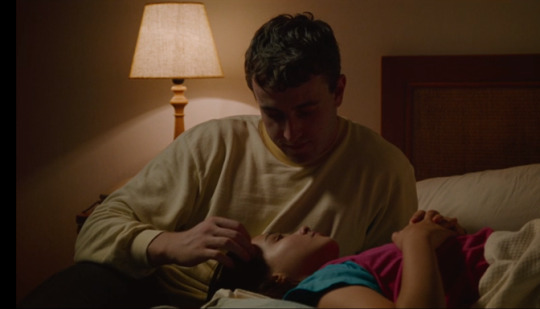
Here is a scene that cuts deep, showing that even when they are together they are apart (alt. even when they’re apart, they’re together). They are in completely different headspaces. The left side is so warm. Take in the innocence of Sophie’s feigning to read. The coziness and comfort of the lamp. The cushiness of the chair and armrests. And Calum’s side is so cold and sterile. A thick slab of wall exists between them. The barrier from Sophie to Calum’s troubled headspace is impermeable.

What does it mean to capture a person?
I mentioned before that this movie puts you in Adult Sophie’s shoes and makes you react spontaneously to Calum’s recordings. It makes me also think about technology helps us to remember and the way it distorts memory.
We are able to make sense of the airport clip and shaky phone footage as something shot from Calum’s/Sophie’s distinct perspective. But what do we make of the rest of the movie, the “third-person” perspective? To what extent do you assume that what you see during those scenes of Turkey on holiday are what actually happened?
I argue that even though they are not shot in first-person, they are meant to be partial. The camera is oriented so that we are watching Sophie watching Calum. So often it is trained on the process of looking out. Feel the difference in the way the camera accommodates Sophie’s entire image and the way it flirts Calum’s profile. This is a barrier of memory. Memory unlocks Sophie access to her younger self; she invites Child Sophie to help her put together the pieces. She does not unlock omniscient retrospection. This is what it’s like to use memory to understand. You replay your interactions with a loved one and try to move your mind’s camera to see if capturing the peach fuzz on their cheek in the light can reveal they were secretly unhappy.
Here’s what you do notice: on the second watch I noticed that during Sophie and the boy’s motorbike game, Calum was keeping an eye on them. The first time I was so engrossed in the foreground. But he’s there, having a smoke, keeping an eye on them.

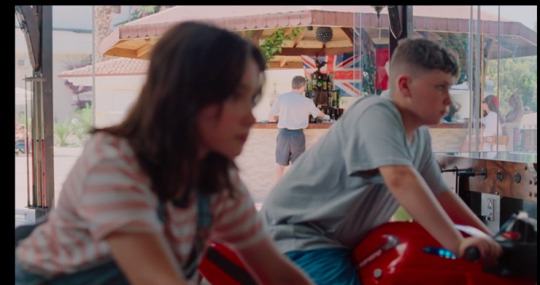
It wasn’t just Sophie looking at Calum but him also looking back at Sophie. Sophie will never find out what he was thinking in that moment but she learns to refocus her mind’s camera to capture the little moments of care that went unappreciated.
This is memory’s greatest offer to us: sympathy.
15 notes
·
View notes
Text
aftersun
Evet evet geldim, yetiştim. Çok boşladım burayı. Bi noktada kendimi de. Gereklilik olarak görmekten çıkıp kendime iyilik ediyorum diye düşünüp yazmaya ve dökmeye başlıyorum.
Filmi izleyeli iki ay oldu sanırım. Duygusuna girebilmek adına arkaya “Gamsız Hayat” açtım. Önümde bir deniz manzarası olsa çok daha iyi olacaktı ancak gri şehirle baş başayız. Aftersun için filmi izledikten sonra hemen bir şeyler yazmıştım. Yarım kalan yazıları tamamlamayı severim.

“hepimizin bi terapiye ihtiyacı var”
Filmi bitireli sanırım bir saat filan oldu. Ben bu filmi aşamayacağım sanırım ya. Basit bir baba kız ilişkisini anlatıyor diyebilirim belki ama hayır. Hepimizin içinde biriktirdiğimiz bir şeyleri taşıyor film. Babamı kaybetmedim, çocuğum yok. Yine de anlatmak istediğini anlayıp filmin sonunda boğazımda koca bi yumruyla kaldım. Oysa isyan etmek bazı şeylere, neden diye hesabını sormak, haykıra haykıra ağlamak istiyordum. Öylece kaldım.

Filmin konusu gibi şeylerden bahsetmek istemiyorum. Hatta mümkünse filme dair bir şeyler bilmeden bu filmi izlemek isterdim, tavsiyedir. Çok şey biliyordum. Biraz bunun da duygu yükü üzerimdeydi.
Filmi film olarak değerlendirdiğimde izlediğim en muhteşem film diyemem aslında. Ancak bir yönetmen açısından ilk film bu kadar mütiş olabilirdi. Tüm sahnelerin bir duygusu vardı. Cümleler akışındaydı. Filmin renk paleti ise… Zihnimde çocukluğuma dair bir sahne canlanıyor. Yaz aylarının ağustos böceklerinin sakin sesleriyle dolu, perdeyi kımıldatan serin rüzgârın salona girdiği akşamlarından biri. Televizyonda izlediğim animasyon film reklam arasına girmiş ve algida dondurmanın reklamı dönüyor. Tam olarak bu canlanan sahnenin renkleri vardı filmde. Sanırım hepimizi çocukluğumuza götüren de buydu. Hatta ve hatta Babam ve Oğlum filmi de benzer tonda. Ama sadece renklerde. Filmi izlerken çok kez düşündüm. Çağan çekseydi bu filmi salya sümük olmuştuk. Oysa Aftersun’un böyle bi amacı yok.
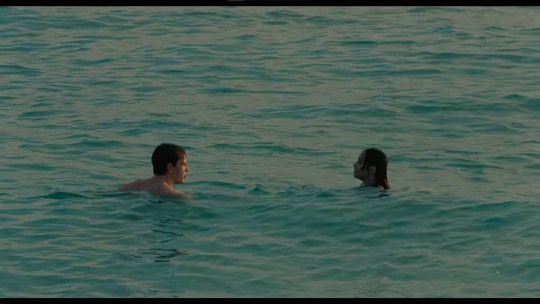

Spoiler içerebilir şeklinde minik bir uyarıyı yapmak için geç kaldım mı bilmiyorum. Filme dair bir şey bilmeden izlendiğinde muhtemelen babanın buhranına ve intihara giden yola dair işaretler çok net gelmeyecek. En azından filmi izlemiş birkaç kişiden bu dönüşü aldım. Ama depresyonun kıyısından bile olsa geçmiş ve bunun farkında olanlar olarak Callum’un doğum gün kutlamasından sonra hüngür hüngür ağlamasının nedenini hepimiz biliyorduk. Kendi yolunu da bulmaya çalışıyor aslında, yine hepimiz gibi. Hayatın amacını bulmaya, bedenini ve ruhunu fark etmeye çalışıyor. Bir şeyler eksik, bir şeyler ağır, bir şeyler mavi. Film tam olarak bu üç cümlede. Bu üç cümle yönetmenin dediği gibi hasret taşıyor.

Filmden hatırımda kalan 3-4 sahne var. Fotoğraf sahnesi bunlardan biri. Bir yaz hatırasının anlatıldığı bu kadar sinematik anlatılabilirdi. Bu sahneye övgüler dizmekten yorulmam. Bir fotoğrafın zamanla belirmesi gibi anıların acımasızca zihnimizde silikleşmesi hayatın acımasız tarafı. O anıyı en iyi böyle saklayabilirmiş Charlotte Wells.
Film soundtrack’ı zaten harika ve Gamsız Hayat bir süre bu filmle çalacak beynimde. Ancak bu filmde bir şiir olsaydı bir yerlerde şu dizeler geçerdi:
Adam hüzünlü / Hüzünlü şarkılar gibi hüzünlü / Kadın güzel / Güzel anılar gibi güzel / Çocuk / Güzel anılar gibi hüzünlü / Hüzünlü şarkılar gibi güzel

(ps: yazıyı bitirmek benim için neden bu kadar zor oldu anlamasam da paul mescal bebeğim o oscarı alabilirdin ya)
7 notes
·
View notes
Note
ppl r losers on the internet i swear find a job get a hobby stop trying to dime serotonin from weird one sided internet feuds
anyways i disagree with your take on aftersun. tbh it didn’t rlly click with me until(spoilers ig) i read online that it seems that the implication is that colm died or committed suicide or something happened right after and that was her last memory of him as she knows him. i don’t ascribe the fondness towards the movie to that theory but it to me the movie is about sophie trying to look for signs she missed about her father whilst also trying not to tarnish the whole picture which is smth i can relate to tbh idk
Yeah I kinda understood that angle after reading some reviews. And the dance scene towards the end is really really good at nailing that in. But I just kinda wish it was felt and explored more before that? Like the scenes of adult her felt tacked on and underdeveloped (to me!) where they could’ve more succinctly alluded to her trying to reconcile her memory vs the reality of her fathers life and it’s end. I did really think he was going to kill himself a star is born style when he walked into the water lmao but I’m glad it didn’t end there. But yeah I realize I’m in the minority here I do wish I liked it more bc again that dance scene is so beautiful and heartbreaking
7 notes
·
View notes
Text
Aftersun
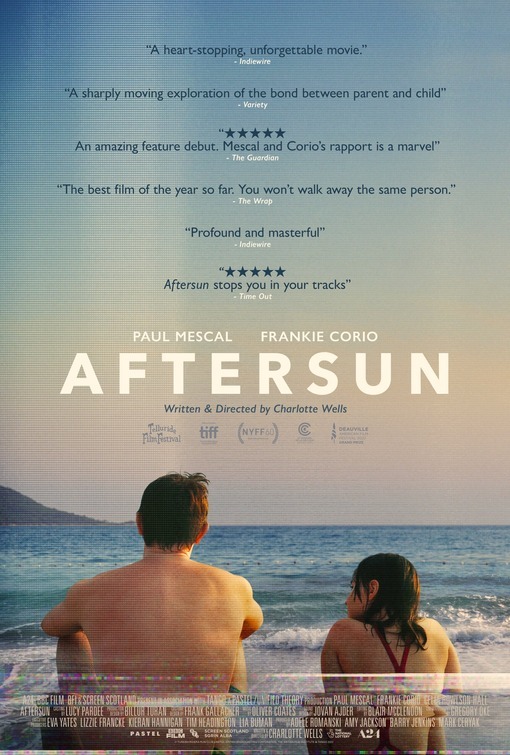
Direct and written by: Charlotte Wells.
//TW//Spoiler Alert
Setelah lama menanti-nanti, akhirnya bisa juga nonton film panjang pertama besutan Charlotte Wells ini. Film yang dibintangi oleh Paul Mescal, Frankie Corio, dan Celia Rowlson-Hall ini sudah bisa ditonton di Indonesia melalui platform KlikFilm.
Aftersun pertama kali dirilis pada 21 Oktober 2022 di Amerika Serikat melalui distributor A24 dan langsung mencuri banyak perhatian para kritikus serta penikmat film.
Film ini menceritakan perjalanan liburan seorang ayah bernama Calum Aaron Patterson (Paul Mescal) dengan anak tunggal perempuannya yang bernama Sophie Lesley Patterson (Frankie Corio) ke Turki. Perjalanan ini menjadi perjalanan yang mengesankan sebab setelah perceraian yang dialami Calum dan Ibunya, mengakibatkan Sophie dan ayahnya tinggal jauh terpisah.
Pada awal film, penonton disuguhkan cuplikan vlog yang dibuat oleh Sophie dan Calum menggunakan kamera miniDV miliknya. Dalam cupilkan ini, terdapat dua momen yang sangat jelas tergambar. Yang pertama adalah wawancara Sophie dengan Ayahnya yang mana ia bertanya kepada ayahnya "when you're 11, what did you think you would be doing now?" rasa penasaran yang muncul sebab Sophie baru saja berulang tahun ke-11, sementara Calum telah berusia 30-an. Momen kedua adalah momen perpisahan antara Calum dan Sophie di bandara di mana mereka berdua saling melempar kata "I love you" sebagai salam perpisahan. Tidak ada yang spesial diantara dua momen ini saat kita baru melihatnya. Tapi semua akan terasa berbeda saat kita mulai menyelami film ini.
Di sela-sela cuplikan tersebut, muncul scene seperti sebuah "glitch" dari sosok Sophie dewasa yang diperankan oleh Celia Rowlson-Hall juga momen-momen lain yang mereka lewati sepanjang liburan. Nampaknya ini menggambarkan bahwa apa yang kita liat adalah bagian dari kenangan Sophie yang sedang ia usahakan untuk ingat kembali.
Bagiku paruh pertama film Aftersun terasa agak lamban, membosankan, dan membingungkan. Maklum, aku menonton ini karena terhasut ulasan-ulasan fantastis para sinefil. Jadi aku berekspektasi akan menemukan sesuatu yang menakjubkan sedari awal, tapi memang bukan begitu cara film ini memberikan kesan bagi para penontonnya.
Menginjak paruh kedua, semuanya terasa lebih menarik. Kita disuguhkan dua perspektif berbeda dari sudut pandangan Sophie dan Calum. Sophie yang memasuki masa remajanya mulai penasaran terhadap banyak hal termasuk lawan jenis. Tampak bahwa ia seringkali mengamati sekumpulan muda-mudi (perempuan dan laki-laki) yang sedang berlibur di hotel yang sama dengannya. Sophie juga tak melewatkan kesempatan untuk bisa berkenalan dan bermain bersama mereka. Sementara Calum, yang akan berulang tahun ke 31, diam-diam merasa telah menjalani hidup yang gagal.
Rasa getir dan sakit itu, ia sembunyikan lewat "gerakan-gerakan aneh" (yang pada akhirnya aku paham kalau itu adalah usaha untuk menenangkan diri, semacam meditasi) dan sikap tenangnya demi perjalanan liburan yang menyenangkan dengan putrinya. Namun, Sophie nampaknya mulai menyadari bahwa sesuatu terjadi pada ayahnya saat Sophie tidak sengaja menjatuhkan kacamata renang yang ia rasa berharga cukup mahal bagi ayahnya.
Lewat Aftersun, Wells menyuguhkan alur perjalanan ayah-anak yang manis dan hangat meski perlahan namun pasti ia membawa penonton memupuk rasa sesak di hati sampai akhir film. Sementara Paul Mescal dan Frankie Orio berakting dengan sangat baik hingga mampu menyampaikan emosi di tiap scene secara tepat yang menjadikan penonton ikut larut di dalam cerita mereka dan ikut merasakan apa yang mereka rasakan.
Dengan percaya diri, aku bisa bilang Aftersun adalah film terbaik yang aku tonton tahun ini dan aku ingin memaksa kalian untuk menontonnya barang sekali. Aftersun bisa ditonton secara legal di platform KlikFilm!
3 notes
·
View notes
